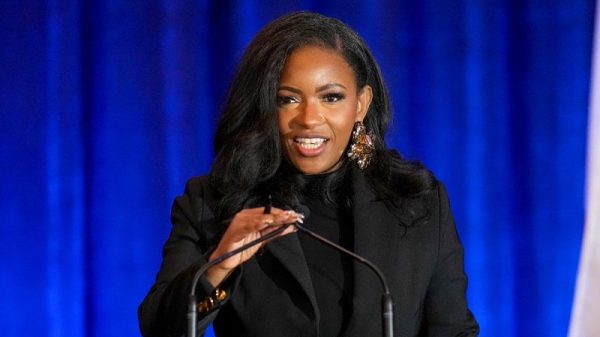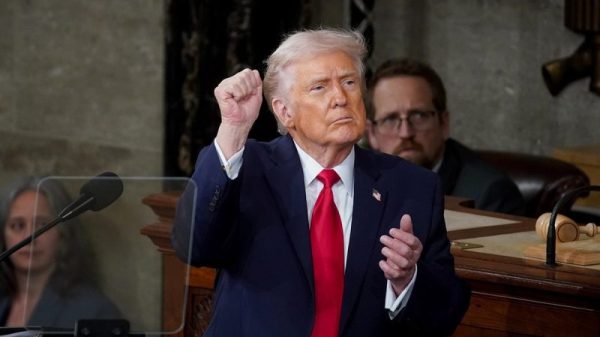The presidential campaign matchup most Americans oppose is becoming a reality.
Republican National Committee Chairwoman Ronna McDaniel dropped her vow of neutrality after Tuesday’s New Hampshire primary to call for her party to “unite around our eventual nominee, which is going to be Donald Trump.”
Republican fundraisers have been racing to line up major donors to back former president Trump in a spring advertising offensive against President Biden, and the Republican National Committee is putting finishing touches on a joint fundraising agreement that will allow its nominee to tap wealthy donors for checks larger than $800,000.
Biden, for his part, has announced that two of his top White House aides will move to his campaign operation, a sudden shift that his staffers attribute the accelerating pace of the GOP nomination process. Biden’s advisers have also sharpened their attacks on Trump, accusing him of running a campaign of “revenge and retribution,” while declaring publicly Wednesday that the Republican nomination fight is over.
“We are just looking at the reality of the data,” said Michael Tyler, the communications director of the Biden campaign. “This campaign is now laser-focused on presenting that direct choice to the American people.”
Never in modern history have two less-popular choices than Trump and Biden faced off on the November ballot. Public and internal polling for months have found an electorate strongly averse to a 2020 campaign do-over, unwilling to accept the choice before it. Yet the next nine months are likely to feature these two unpopular figures forcefully attacking each other and trading accusations of mental incompetence.
The Trump and Biden teams both have reasons to want the general election campaign to begin. Trump is eager to stop spending money and attention on his Republican rivals so he can fully focus on the president. Biden has long viewed a one-to-one comparison with Trump as his strongest asset, and that dynamic is muddied so long as other Republicans remain in the race.
For now, former U.N. ambassador Nikki Haley continues to campaign against Trump, despite her double-digit losses in Iowa and New Hampshire. Haley’s closing message in New Hampshire — that most Americans do not want a Trump-vs.-Biden matchup — failed to lift her campaign to victory.
More than half of Americans have unfavorable views of Trump, 77, and Biden, 81, in public polls. More than half say they are “dissatisfied” by the choice, and even larger majorities say they do not want each man to run. In one December Monmouth University poll, nearly half of respondents said they would “definitely not” vote for either man — 49 percent for Biden and 48 percent for Trump. An additional 7 percent will “probably not” vote for Biden, while 8 more percent will “probably not” vote for Trump.
Both the Trump and Biden campaigns, aware of this dynamic, see redemption in driving home their opponent’s unpopularity.
Trump has taken to calling his opponent’s camp “crooked Joe Biden and his radical band of lunatics.” He refers to the federal and state prosecutions against him as an effort by “Biden and his thugs,” though there is no evidence that Biden has been involved in the decisions to charge Trump with an array of crimes. He has made mocking Biden’s mental competence a standard part of his stump speech.
Biden avoided mentioning Trump by name early in his presidency, but that has changed dramatically this year. “Donald Trump’s campaign is about him — not America, not you,” Biden said in a recent Pennsylvania speech that blamed Trump’s words for the death of police officers in the Jan. 6 Capitol riots.
On Tuesday, Biden attacked Trump multiple times by name during an abortion rights rally in Manassas, Va., saying the former president was responsible for the termination of Roe v. Wade.
Biden and his allies believe abortion rights and protecting democracy will be key issues for voters, often saying that Democrats’ focus on those areas in 2022 paid dividends in the midterm elections.
“The longer these abortion bans are in place in the 21 states and counting that have bans, the more salient and compelling the issue gets,” said Mini Timmaraju, head of Reproductive Freedom for All. “I don’t think we’ve seen any evidence that it’s slowing down, and I think anecdotally the horror stories are just going to get worse.”
Biden’s decision to dispatch top White House aides Jen O’Malley Dillon and Mike Donilon to the campaign, announced Tuesday as voting was concluding in New Hampshire, is expected to speed the Biden campaign’s decision-making after months of complaints about the bifurcated structure of the operation.
O’Malley Dillon, the architect of much of Biden’s reelection strategy, worked as his 2020 campaign manager before joining the White House. Donilon, one of Biden’s longest-serving advisers, will reprise his 2020 role as chief strategist, helping to lead the campaign’s messaging, polling and advertising efforts.
Democratic researchers last year found a clear disconnect between Biden’s approval ratings and Democrats’ performance at the polls. The reason, they argue, is that Americans increasingly vote against what they hate, not for what they like.
Given that, many Democratic strategists believe that negative ads and messaging against Trump will be more important in this election than they were in the 2018 and 2020 campaigns, when Trump’s personality and actions loomed in voters’ minds. Democratic surveys and focus groups have found that targeted voters today are less well-informed about the former president and what he stands for.
“Many voters have not paid attention to Donald Trump since the Jan. 6 insurrection and are not aware of the variety of ways that he has become more extreme and more unhinged,” Democratic pollster Geoff Garin, who has been conducting research for the coming campaign, said in a statement. “Alarm bells go off when voters hear that Trump says he wants to be dictator for a day, but many voters are not aware yet that he has said it repeatedly.”
Biden’s strategy depends heavily on the election becoming a binary choice between himself and Trump. That has spawned an effort by Democrats to start attacking the independent candidacy of attorney Robert F. Kennedy Jr. as well as a potential presidential ticket backed by the moderate group No Labels.
“Our job is going to be to explain that right now we live in a two-party system, and that a third party is not really an option,” said Maria Teresa Kumar, the founder of Voto Latino, a liberal advocacy group. “Our job is to explain to our young people and to our constituency that a vote for a third party is a de facto vote for a MAGA extremist that threatens not just our community, but the country itself.”
The Trump campaign has also been drawing up plans for the general election, according to people familiar with the conversations, who spoke on the condition of anonymity to discuss internal strategy. Trump allies believe they have new ways of framing the race around Biden’s struggles in office, attacks that were not available to them in the 2020 race.
“Now it’s about Biden’s failed record on the issues that voters care about most — it’s the border, it’s inflation,” said Jim McLaughlin, a longtime pollster for Trump. “The network exit polls back in 2020 didn’t even ask about those issues.”
Republicans are also rushing to put a new fundraising structure in place. Officials for MAGA Inc., a super PAC that has supported Trump with $35.8 million in ad spending during the nomination fight, has been warning donors for weeks that Democrats could shift the race this spring with a massive television blitz in swing states.
At a recent meeting of Trump donors at Mar-a-Lago, MAGA Inc. leaders pitched a nine-figure budget to combat such a spring advertising offensive. Slides from the presentation, which were obtained by The Washington Post, include an analysis of 2022 Senate ads that showed Democrats had gone on the air months before Republicans did in key races.
The group’s leaders have told donors that they expect the Biden campaign and affiliated groups to spend $306 million in the first half of 2024 across seven targeted battleground states — Arizona, Georgia, Michigan, North Carolina, Nevada, Pennsylvania and Wisconsin.
One person present at the pitch, who spoke on the condition of anonymity to describe a private gathering, said the group’s leaders argued that the general election has already started.
“President Trump has a clear path to win, but Democrats are spending more money and they are doing it earlier than ever before,” the person said, recalling the pitch. “If we don’t move quickly to combat this, we will lose the advantage that President Trump currently maintains.”
Biden, who has benefited from strong, early grass-roots fundraising, has spent about $50 million on advertising so far along with his allies, almost all in swing states, according to the tracking firm Ad Impact. Trump meanwhile, has spent about $55 million with his allies, mostly in states such as New Hampshire and Iowa that are important for the nomination contest but are not expected to be closely contested in November.
Biden began raising money last year through a coalition of Democratic Party accounts, allowing him to solicit checks as large at $929,600 from individual donors. The RNC is now putting the finishing touches on its own $836,300 bundling program with state parties, which will be available in the coming weeks, according to a person familiar with the plan who spoke on the condition of anonymity because they were not authorized to speak publicly about it.
Ad Impact expects $2.7 billion in spending on presidential ads this cycle, with most of the money being used over the next nine months. Regardless of whether they like the options before them, voters will be asked to choose.
Scott Clement contributed to this report.
The presidential campaign matchup most Americans oppose is becoming a reality.
Republican National Committee Chairwoman Ronna McDaniel dropped her vow of neutrality after Tuesday’s New Hampshire primary to call for her party to “unite around our eventual nominee, which is going to be Donald Trump.”
Republican fundraisers have been racing to line up major donors to back former president Trump in a spring advertising offensive against President Biden, and the Republican National Committee is putting finishing touches on a joint fundraising agreement that will allow its nominee to tap wealthy donors for checks larger than $800,000.
Biden, for his part, has announced that two of his top White House aides will move to his campaign operation, a sudden shift that his staffers attribute the accelerating pace of the GOP nomination process. Biden’s advisers have also sharpened their attacks on Trump, accusing him of running a campaign of “revenge and retribution,” while declaring publicly Wednesday that the Republican nomination fight is over.
“We are just looking at the reality of the data,” said Michael Tyler, the communications director of the Biden campaign. “This campaign is now laser-focused on presenting that direct choice to the American people.”
Never in modern history have two less-popular choices than Trump and Biden faced off on the November ballot. Public and internal polling for months have found an electorate strongly averse to a 2020 campaign do-over, unwilling to accept the choice before it. Yet the next nine months are likely to feature these two unpopular figures forcefully attacking each other and trading accusations of mental incompetence.
The Trump and Biden teams both have reasons to want the general election campaign to begin. Trump is eager to stop spending money and attention on his Republican rivals so he can fully focus on the president. Biden has long viewed a one-to-one comparison with Trump as his strongest asset, and that dynamic is muddied so long as other Republicans remain in the race.
For now, former U.N. ambassador Nikki Haley continues to campaign against Trump, despite her double-digit losses in Iowa and New Hampshire. Haley’s closing message in New Hampshire — that most Americans do not want a Trump-vs.-Biden matchup — failed to lift her campaign to victory.
More than half of Americans have unfavorable views of Trump, 77, and Biden, 81, in public polls. More than half say they are “dissatisfied” by the choice, and even larger majorities say they do not want each man to run. In one December Monmouth University poll, nearly half of respondents said they would “definitely not” vote for either man — 49 percent for Biden and 48 percent for Trump. An additional 7 percent will “probably not” vote for Biden, while 8 more percent will “probably not” vote for Trump.
Both the Trump and Biden campaigns, aware of this dynamic, see redemption in driving home their opponent’s unpopularity.
Trump has taken to calling his opponent’s camp “crooked Joe Biden and his radical band of lunatics.” He refers to the federal and state prosecutions against him as an effort by “Biden and his thugs,” though there is no evidence that Biden has been involved in the decisions to charge Trump with an array of crimes. He has made mocking Biden’s mental competence a standard part of his stump speech.
Biden avoided mentioning Trump by name early in his presidency, but that has changed dramatically this year. “Donald Trump’s campaign is about him — not America, not you,” Biden said in a recent Pennsylvania speech that blamed Trump’s words for the death of police officers in the Jan. 6 Capitol riots.
On Tuesday, Biden attacked Trump multiple times by name during an abortion rights rally in Manassas, Va., saying the former president was responsible for the termination of Roe v. Wade.
Biden and his allies believe abortion rights and protecting democracy will be key issues for voters, often saying that Democrats’ focus on those areas in 2022 paid dividends in the midterm elections.
“The longer these abortion bans are in place in the 21 states and counting that have bans, the more salient and compelling the issue gets,” said Mini Timmaraju, head of Reproductive Freedom for All. “I don’t think we’ve seen any evidence that it’s slowing down, and I think anecdotally the horror stories are just going to get worse.”
Biden’s decision to dispatch top White House aides Jen O’Malley Dillon and Mike Donilon to the campaign, announced Tuesday as voting was concluding in New Hampshire, is expected to speed the Biden campaign’s decision-making after months of complaints about the bifurcated structure of the operation.
O’Malley Dillon, the architect of much of Biden’s reelection strategy, worked as his 2020 campaign manager before joining the White House. Donilon, one of Biden’s longest-serving advisers, will reprise his 2020 role as chief strategist, helping to lead the campaign’s messaging, polling and advertising efforts.
Democratic researchers last year found a clear disconnect between Biden’s approval ratings and Democrats’ performance at the polls. The reason, they argue, is that Americans increasingly vote against what they hate, not for what they like.
Given that, many Democratic strategists believe that negative ads and messaging against Trump will be more important in this election than they were in the 2018 and 2020 campaigns, when Trump’s personality and actions loomed in voters’ minds. Democratic surveys and focus groups have found that targeted voters today are less well-informed about the former president and what he stands for.
“Many voters have not paid attention to Donald Trump since the Jan. 6 insurrection and are not aware of the variety of ways that he has become more extreme and more unhinged,” Democratic pollster Geoff Garin, who has been conducting research for the coming campaign, said in a statement. “Alarm bells go off when voters hear that Trump says he wants to be dictator for a day, but many voters are not aware yet that he has said it repeatedly.”
Biden’s strategy depends heavily on the election becoming a binary choice between himself and Trump. That has spawned an effort by Democrats to start attacking the independent candidacy of attorney Robert F. Kennedy Jr. as well as a potential presidential ticket backed by the moderate group No Labels.
“Our job is going to be to explain that right now we live in a two-party system, and that a third party is not really an option,” said Maria Teresa Kumar, the founder of Voto Latino, a liberal advocacy group. “Our job is to explain to our young people and to our constituency that a vote for a third party is a de facto vote for a MAGA extremist that threatens not just our community, but the country itself.”
The Trump campaign has also been drawing up plans for the general election, according to people familiar with the conversations, who spoke on the condition of anonymity to discuss internal strategy. Trump allies believe they have new ways of framing the race around Biden’s struggles in office, attacks that were not available to them in the 2020 race.
“Now it’s about Biden’s failed record on the issues that voters care about most — it’s the border, it’s inflation,” said Jim McLaughlin, a longtime pollster for Trump. “The network exit polls back in 2020 didn’t even ask about those issues.”
Republicans are also rushing to put a new fundraising structure in place. Officials for MAGA Inc., a super PAC that has supported Trump with $35.8 million in ad spending during the nomination fight, has been warning donors for weeks that Democrats could shift the race this spring with a massive television blitz in swing states.
At a recent meeting of Trump donors at Mar-a-Lago, MAGA Inc. leaders pitched a nine-figure budget to combat such a spring advertising offensive. Slides from the presentation, which were obtained by The Washington Post, include an analysis of 2022 Senate ads that showed Democrats had gone on the air months before Republicans did in key races.
The group’s leaders have told donors that they expect the Biden campaign and affiliated groups to spend $306 million in the first half of 2024 across seven targeted battleground states — Arizona, Georgia, Michigan, North Carolina, Nevada, Pennsylvania and Wisconsin.
One person present at the pitch, who spoke on the condition of anonymity to describe a private gathering, said the group’s leaders argued that the general election has already started.
“President Trump has a clear path to win, but Democrats are spending more money and they are doing it earlier than ever before,” the person said, recalling the pitch. “If we don’t move quickly to combat this, we will lose the advantage that President Trump currently maintains.”
Biden, who has benefited from strong, early grass-roots fundraising, has spent about $50 million on advertising so far along with his allies, almost all in swing states, according to the tracking firm Ad Impact. Trump meanwhile, has spent about $55 million with his allies, mostly in states such as New Hampshire and Iowa that are important for the nomination contest but are not expected to be closely contested in November.
Biden began raising money last year through a coalition of Democratic Party accounts, allowing him to solicit checks as large at $929,600 from individual donors. The RNC is now putting the finishing touches on its own $836,300 bundling program with state parties, which will be available in the coming weeks, according to a person familiar with the plan who spoke on the condition of anonymity because they were not authorized to speak publicly about it.
Ad Impact expects $2.7 billion in spending on presidential ads this cycle, with most of the money being used over the next nine months. Regardless of whether they like the options before them, voters will be asked to choose.
Scott Clement contributed to this report.





















